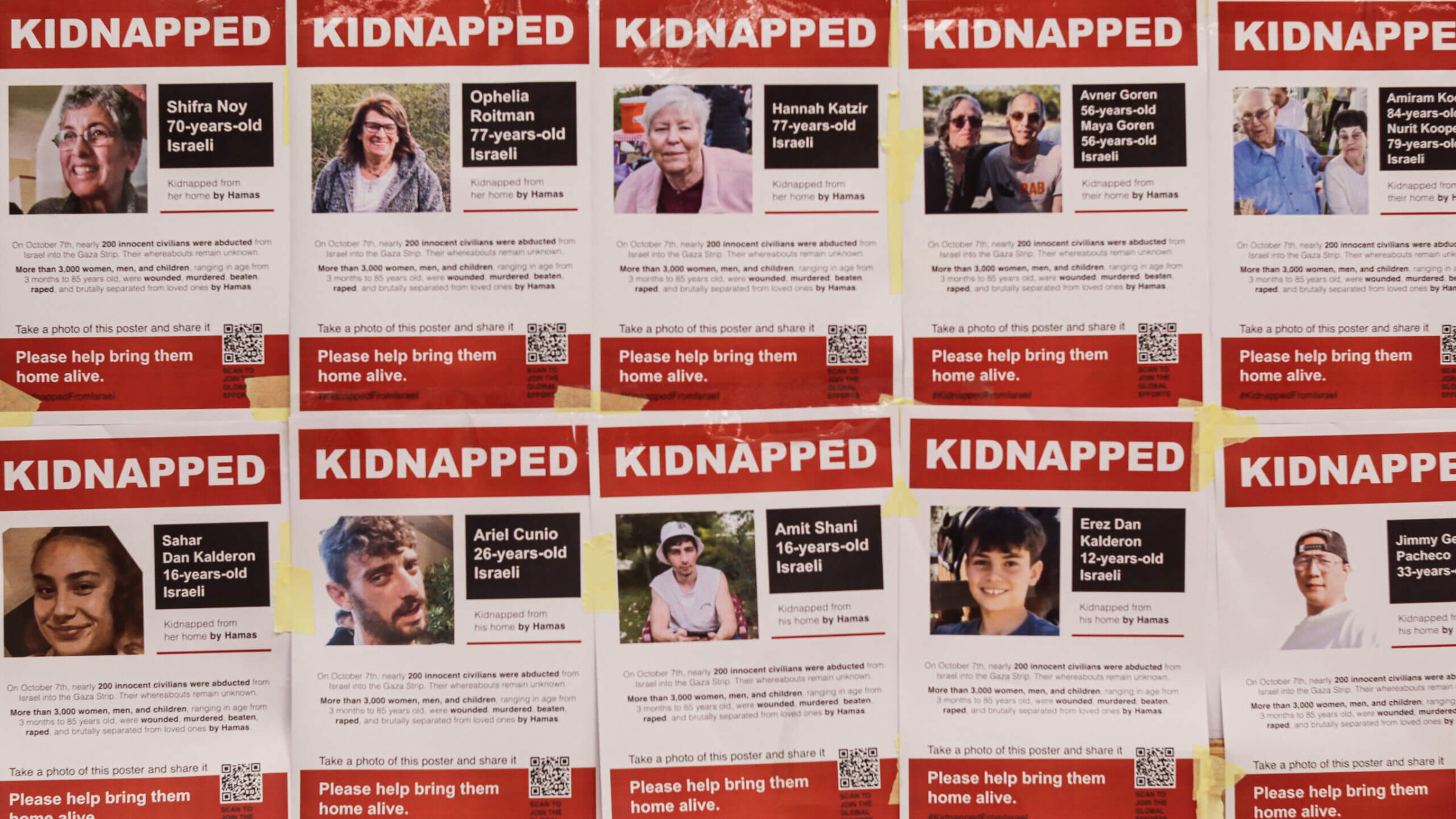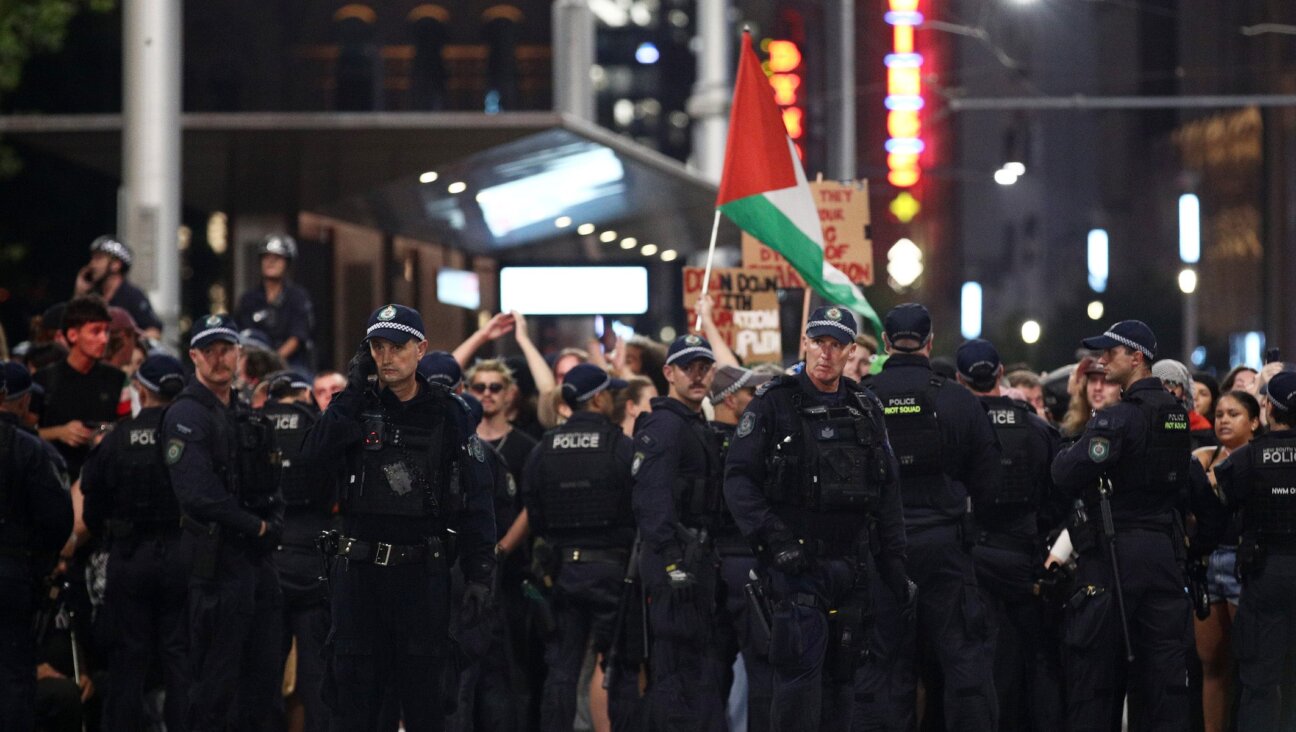Deal to release dozens of hostages appears to be close, US, Israel and Qatar all say
It has been 46 days since Hamas abducted an estimated 240 people from Israel, including dozens of children

Posters showing the faces of Israeli citizens kidnapped by Hamas militants on the wall of a media office in Sderot, southern Israel, on Tuesday, Oct. 17, 2023. Photo by Jonathan Alpeyrie/Bloomberg via Getty Images
(JTA) — Israeli Prime Minister Benjamin Netanyahu has called special meetings of his war cabinet, security council and full government for Tuesday evening, in the clearest sign yet of an imminent deal to free at least some of the hostages taken by Hamas on Oct. 7.
The terror group is holding an estimated 240 people hostage in Gaza, including roughly 40 children. According to the Israeli news website Ynet, the deal would see 53 women, children and elderly hostages released in exchange for roughly 150 Palestinian prisoners who are also women and youths. It would also grant Hamas a four-day pause in the fighting, including pauses in aerial reconnaissance as Hamas locates additional hostages to release.
The deal would also reportedly create a mechanism whereby Israel would release three Palestinians prisoners for every additional Israeli hostage freed by Hamas, and would pause the fighting for one day for every 10 hostages released.
For days, a deal to release the children and some other hostages in exchange for some Palestinian prisoners and a pause in fighting has reportedly been in the works. But according to the Washington Post, which initially reported on Saturday that a deal had been reached, Israeli officials had pushed back against a deal that would involve the release of children without their mothers.
Now, a deal appears to be close, with sources telling Israeli media that they expect the mothers and others to be freed over the course of several days under the terms of an agreement.
U.S. President Joe Biden, whose administration has been involved in brokering talks between Israel and Hamas with Qatar as an intermediary, said Monday that he believed a deal was near. And the foreign ministry of Qatar, where Hamas’ leadership is based, said it was “very optimistic” about the state of negotiations, which it said were at “the closest point” yet.
Now, Netanyahu has called the meetings, announced in a press release midday Tuesday, saying that the government would meet that evening “in light of the developments regarding the release of our hostages.”
The movement comes 46 days after Hamas attacked Israel, killing 1,200 people and taking hundreds hostage. After freeing four hostages about two weeks later, the terror group has not released any others nor provided evidence of their wellbeing to the Red Cross or public. Israeli forces freed one hostage soldier and retrieved the bodies of three other hostages who died in Gaza. Several of the remaining hostages were known to have been injured, some seriously, on Oct. 7.
The plight of the hostages has riveted the world, with posters and large-scale installations on their behalf going up (and in some cases being taken down) in major cities. Groups of celebrities have promoted their stories.
But within Israel, many of the families of the hostages have said they feel abandoned by the government, and a protest march from Tel Aviv to Jerusalem drew 30,000 people last week. On Monday, as negotiations advanced, far-right lawmakers in Israel’s parliament yelled at relatives of hostages who were exhorting them not to discuss instituting a death penalty for terrorists until their loved ones were freed.
Israeli officials have cautioned that any truce would not amount to a ceasefire, which would end hostilities permanently and leave Hamas in power. Israel has said that its goal in the war — which according to the Hamas-run Health Ministry in Gaza has killed more than 10,000 people — is to depose the terror group.
This article originally appeared on JTA.org.
















